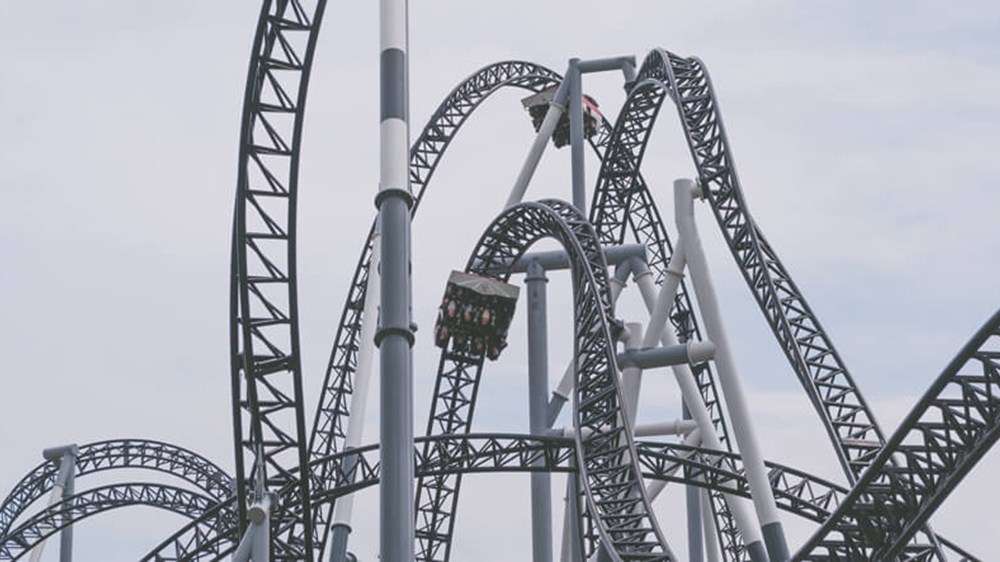For the first time since 2009, the UK has entered a recession. But what exactly does this mean? Although many investors may have gone through a recession before, it might be a new experience for some, and this can be daunting.
In this beginners’ guide, we’ll tell you exactly what a recession is, what the potential impact of it is, how you could prepare for it, and what it could mean for your investments.
What is a recession?
In its simplest form, a recession is when a country experiences a period of economic decline for two quarters (six months) in a row or longer.
Economic performance is measured by Gross Domestic Product (GDP), which calculates the value of the goods and services their country sells– if this number falls, the economy has shrunk. And if this continues for two quarters in a row, then the country will technically enter into a recession. Typically, this would come at a time when most monthly indicators, such as unemployment, industrial production, and wholesale-retail sales decline. But that this isn’t always the case, especially in a mild recession.
What causes a recession?
There are a wide number of things that could cause a recession, but ultimately how and why they happen often comes down to real changes in the economy or structural shifts in industries. For example, the rapid spread of Covid-19 required global lockdown measures to be introduced which slowed down the economy in Q1 and Q2 of 2020.
What is the impact of a recession?
A recession will have a wide number of impacts, affecting the economy, businesses, and individuals differently.
- The impact on economy – during a recession, monetary and fiscal policy are often put in place to reduce the negative impact, this typically includes measures to reduce unemployment and boost demand which bolsters prices, and support businesses. For example, the central bank cutting interest rates typically supports consumer spending or the buying of investments, as it increases the cost of leaving money in an otherwise stagnant savings account.
- How do businesses fair - Both small and large businesses can be impacted by a recession, often seeing sales and profits decline. When this happens, revenue growth typically slows, hiring is cut back or worst still stopped, spending is reduced, budgets are shrunk, production may be reduced, and in some cases, businesses may have to lay-off some their employees.
- The impact on individuals – unfortunately, unemployment often rises during a recession, and as a result there’s often less consumer spending. Both of these changes would have an impact on the labour market, as a potential rise or even the threat of a rise in unemployment can also see lower wage growth. This is because people typically change jobs less during this period and feel as though they are in a weaker negotiating position.
It’s important to note that not everyone will have the same experience during a recession as some industries are more recession proof than others, for example, healthcare professionals and utility workers. Similarly, not all recessions are the same and can differ in severity.
Can you prepare for a recession?
The good news is that there are several things that you could do which may help in a recession, many of these are considered as good financial practice.
- Live within your means – living a flashy life ‘for the gram’ is great if you can afford it, but if you’re stretching yourself beyond your means then it’s very hard to build up any savings. Living within your means doesn’t mean scrimping and saving, it just means being sensible and thinking about putting some of your income away each month.
- Look into paying off debt – saving is great, but if you have debt with a high interest rate then this can grow and become overwhelming. Most debt collectors won’t care if there’s a recession on, as it impacts them too. Trying to pay off your debt when you can could help to put you in a better position in the long run.
- Consider building up emergency savings – if you’re living within your means, it’s a lot easier to build up an emergency savings pot, after all, you never know what’s around the corner! Having enough savings built up to cover any unexpected events could help to reduce the strain of a recession on your household.
- Think about diversifying your investments – if you’re an investor, then the potential impact of a looming recession may sound quite scary, but if your portfolio is properly diversified – like our Wealthify Plans where your money is spread across investment types and regions – then this could smooth out your returns over the long run. We’ll go into this in more detail in a bit.
Whether or not we’re currently in a recession, are waiting for one to be announced, or the country is thriving in economic growth, the above precautions could help to put you in a strong financial position. As the saying goes, you want to mend the roof when the sun is shining.
Should I consider investing during a recession?
Whether or not you should continue, or start, to invest during a recession will depend on your own personal finances. It’s worth saying that bear markets will typically lead to recessions, which may not sound that appealing, but markets are forward looking and can move very quickly, up and down. So, even in a bear market there are sometimes good days which could positively impact your investments.
There are also plenty of ‘safer’ investments you can hold during a recession, such as cash and bonds, which are less likely to move as drastically in price as, say, stocks and shares may do. But one of the most important things to do when investing during a recession is to consider the diversification of your investments. By having lots of different investment types, you can reduce unnecessary risk, as a negative result on one investment could be outweighed by a positive performance on another.
Should I review my investment risk?
There are many reasons why you may want to review the level of risk you take. If you’re not sure whether your investment style is still appropriate, it may be worth taking some time to better understand your investment risk style.
Can you make money investing in a recession?
You may be thinking that if the markets are down because of a recession then it would make a good opportunity to try and ‘time’ the markets. And you’re not entirely wrong, because if it feels like everyone is selling and few people are buying then the price can rapidly fall and the investment could be undervalued, providing the potential for profit. But timing the market is a very risky way to approach investing – especially during a recession, as you could find that your investment continues to fall even if you thought you bought at the bottom.
Arguably, some of the best approaches you could take to investing during a recession are the same as those you’re already doing. For example, regularly purchasing investments implements the pound cost averaging strategy which could work to smooth out the market bumps by buying at many different prices.
Another approach is to maintain a long-term outlook to investing. If you’re planning on staying invested for 5, 10 or 15 years or more, then short-term market fluctuations caused by a recession shouldn’t worry you too much. After all, historical data shows that anyone who invested in the FTSE 100 for any 10-year period between 1984 and December 2019 had an 89% chance of making a gain.[1] And that’s a period which includes 16 quarters where the UK saw GDP decline and 10 quarters where the UK was in a technical recession– including the Global Financial Crisis of 2008/09.[2] If you think investing is the right move for you, and you want a team of experts to manage your investments on your behalf, then Wealthify can do just that. We use a combination of clever algorithms and a team of highly experienced investment professional to make decisions and carefully manage customers’ investment plans. You can start investing with as little or as much as you want, with no tie ins or regular contributions required, letting investing fit in around your everyday life.
References:
- Data from Bloomberg
Please remember that past performance is not a reliable indicator of your future results.
With investing, your capital is at risk, so the value of your investments can go down as well as up, which means you could get back less than you initially invested.



